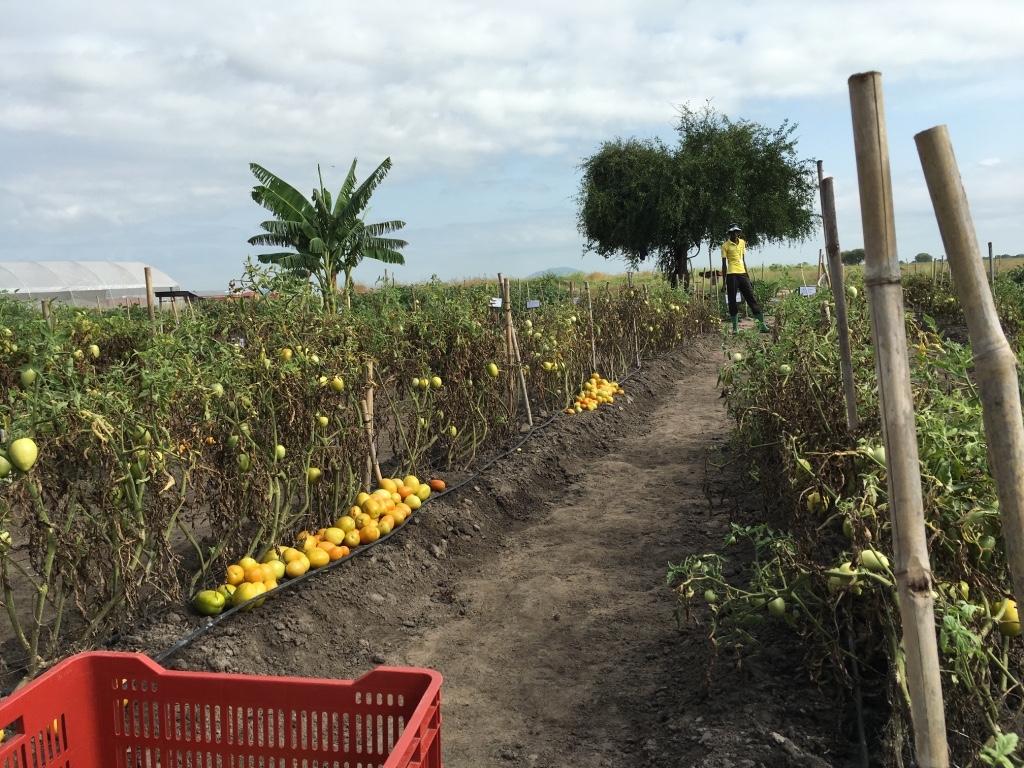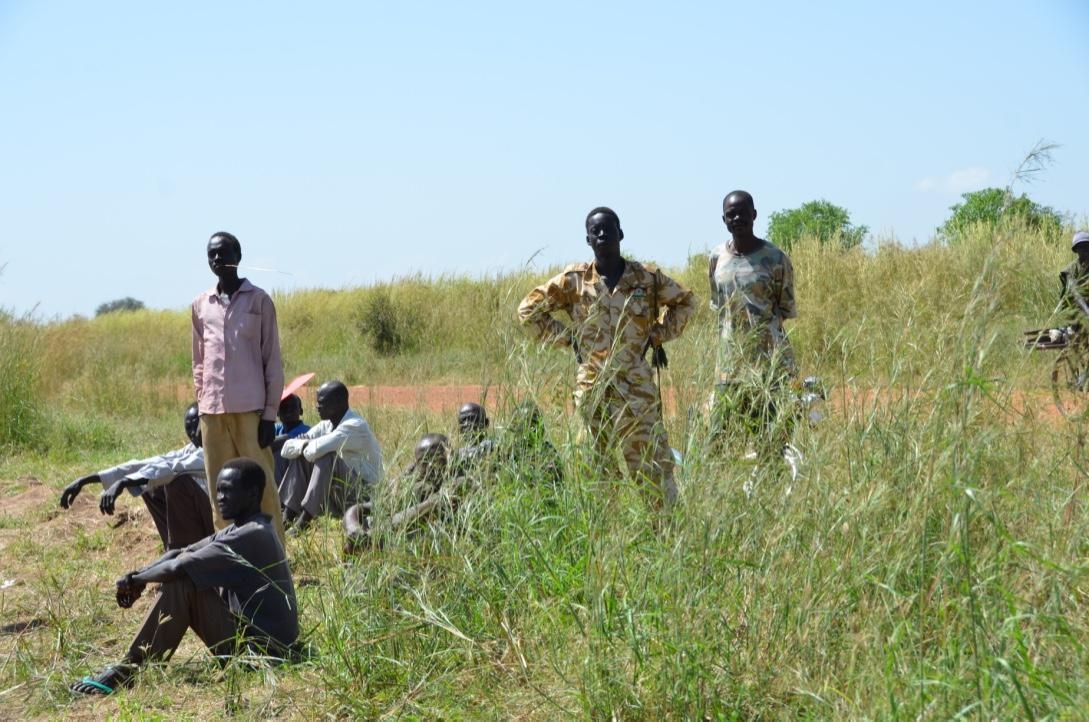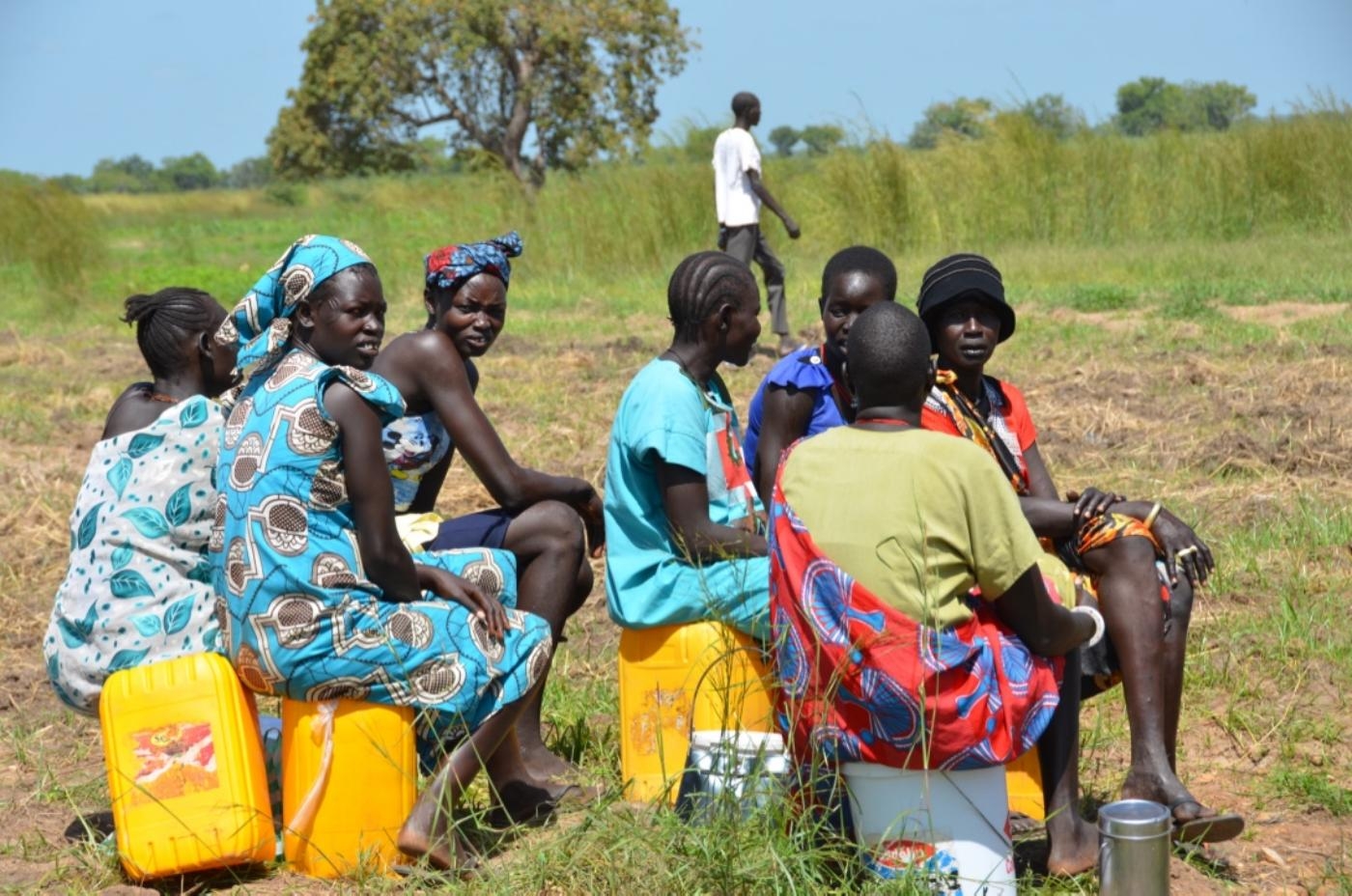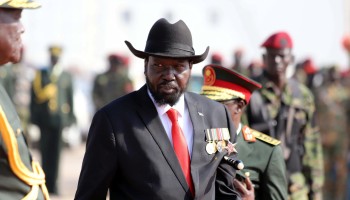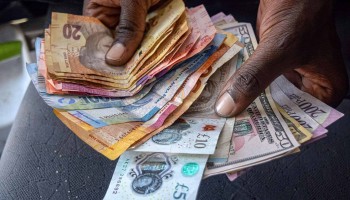Seated on a plastic chair outside a school in South Sudan’s northern town of Aweil, Kristine Akodit shifts her 1-year-old daughter in her arms as she breastfeeds.
“Hunger is here,” says the young mother, whose three children sometimes go days without food. At the launch of a European Union funded school meal program, Akodit hangs her head. This year is worse than last, she says.
Akodit is among the almost seven million South Sudanese people facing hunger — sixty-one percent of the population — with 1.8 million on the brink of starvation. The crisis is largely a consequence of the civil war that broke out in South Sudan in 2013 shortly after it gained independence from the north.
In 2015, the South Sudanese government launched a multi-million dollar project meant to develop farms that would feed its people and even export the surplus.
But according to the U.S. government, the farming project was instead used to cover up the sale of approximately US$150 million in weapons, including rifles, grenade launchers, and shoulder-fired rockets. In December, an Israeli security services firm contracted to run the project, as well as its owner, were blacklisted for allegedly fueling the conflict by supplying arms to both the government and the opposition. In its sanctions announcement, the U.S. Treasury Department mentioned — but didn’t name or blacklist — a “major multi-national oil firm” that was in “close collaboration.”
Newly leaked internal documents, emails, and other records obtained by OCCRP, as well as confirmation by two closely placed sources, show who that collaborator is likely to be: Trafigura Pte Ltd., an oil trading subsidiary of Trafigura Group Pte Ltd., one of the world’s largest commodity trading companies.
The materials show that Trafigura transferred at least $140 million to South Sudan's central bank, ostensibly as pre-payments for crude oil. They also show that the government then transferred nearly the same amount to Global CST, the sanctioned Israeli company. The transfers go far beyond the $45 million allocated to the farming project, called Green Horizon.
The total amount transferred nearly matches the $150 million worth of arms the Treasury Department said Global CST’s owner sold to the government.
Trafigura did not respond to specific questions about whether its money may have been used as payments for arms.
The Company In Between
Trafigura recently surfaced in a separate story about secret money transfers.
The money paid to the Green Horizon farming project never showed up in the government’s budget, a lack of transparency troubling to human rights watchdogs.
“When multimillion-dollar deals are kept off the books and oversight institutions are sidestepped, the money’s either being used to line the pockets of politicians or support military operations,” said J.R. Mailey, investigations director at The Sentry, a Washington-based advocacy group that investigates links between war crimes, corruption, and human rights violations.
The project shows how “multinational companies are benefiting from the violence of South Sudan,” said Edmund Yakani, executive director for Community Empowerment for Progress Organization, a local advocacy organization.
Arming Both Sides
The South Sudan civil war started as a power struggle in 2013, just two years after the country’s independence from Sudan, and escalated along ethnic lines, killing almost 400,000 people and displacing millions.
Expanding Horizons
Global CST is the defense, consulting, and contracting wing of the Global Group, which is owned and operated by Israel Ziv, the former head of the Israeli Defense Forces’ Operations Directorate. The company is also recognized under another name, Global N.T.M., which was also sanctioned by the U.S., as was Ziv individually.
According to the U.S. government, “While Ziv maintained the loyalty of senior Government of South Sudan officials through bribery and promises of security support, he has also reportedly planned to organize attacks by mercenaries on South Sudanese oil fields and infrastructure, in an effort to create a problem that only his company and affiliates could solve.”
In an interview with OCCRP, Ziv called the allegations “absolutely, completely false.”
The Israeli businessman said he first came to southern Sudan in 2008 to connect with the region’s leadership.
“He came with a catalogue of questions, he did not come with answers,” said Costello Garang, a former advisor to South Sudan’s President Kiir, who explained that Ziv wanted to learn about the situation in southern Sudan. “Are we for unity; are we for separation? If we are for unity, what type of unity? If we are for separation, how are we going to defend it?”
Ziv told OCCRP he returned in 2015 to help the now independent country “recover from the war.”
“[I told them] the country cannot grow and recover only based on oil,” said Ziv. That’s when he came up with the idea for the farms, he said, suggesting Israel’s experience in agricultural development as a model. In December 2015, he said, the South Sudanese government awarded him a $45 million contract to implement the five-year Green Horizon agricultural project — Ziv’s sole such venture anywhere, according to the project’s managing director.
Ziv said he didn’t know where the money for the farms originated and that his relationship with Trafigura consisted of consulting the multinational oil trader on its work with South Sudan’s government.
A U.N. Security Council investigation conducted after the U.S. sanctions were issued established that Trafigura retained Global CST’s parent company to provide local assistance in managing its crude oil trades with the government. That agreement was “entirely separate” from Ziv’s other activities or companies in South Sudan, the U.N. said.
"While the company was aware that a portion of [its] prepayment was to be allocated to the Green Horizon project and was supportive of the Government’s allocation of crude oil payments to development spending, Trafigura was not a partner in the project,” the U.N. concluded.
But the leaked documents obtained by OCCRP and interviews with closely placed sources indicate Trafigura collaborated with Ziv’s Global CST on the Green Horizon project. The oil company’s payments to the government were quickly redirected towards Ziv’s company, and the actual total is much higher than the $45 million he claims to have received. Email traffic between Global and Trafigura employees also attests to coordination of financial transfers and organization of joint meetings with government ministers.
There is no evidence that Trafigura knew about Ziv’s alleged arms deals, which he denied in an interview with OCCRP. A Trafigura representative would not comment beyond saying that the company had “fully cooperated with the U.N. panel of experts.”
Security is Ziv’s Business
Before Israel Ziv took on farming, the retired major general leveraged his military experience and connections to offer combat and security consulting, as well as weapons sales, in conflict zones around the world.
Follow the Money
The money trail starts with Trafigura, which paid South Sudan millions of dollars in 2015 and 2016. The funds came in the form of pre-payments for oil that would be delivered in the future, a practice criticized by the IMF as nontransparent.
Though the money went through South Sudan’s central bank, it didn’t stay there.
According to an internal U.N. document verified by two separate sources, Trafigura “dedicated” $50 million out of an oil pre-payment to the Green Horizon farming project in October 2015.
That same month, an internal Global email referred to a $50 million transfer from Trafigura to the central bank that didn’t go through, and directed employees to follow up to ensure the “safe receipt of the funds.”
And three months later, a South Sudanese government document showed that the finance ministry ordered $45 million from a Trafigura prepayment to be transferred from the central bank to Global’s account. (The fate of the remaining $5 million is unknown.)
This transfer appears to cover the announced funding of the Green Horizon project — but it was far from the only money that flowed from Trafigura to Global through South Sudan’s central bank.
Wire transfer details included in a Global email show that Trafigura transferred another $8.4 million to the central bank in May 2016. And a separate Trafigura email, which also included bank transfer details, shows that the company sent another $81.7 million that June.
According to both a former Global employee and a source from the government, neither of whom can be identified to protect their safety, the central bank then sent similar amounts on to Global.
A Trafigura representative declined to comment on the company’s relationship with Global or Ziv, but said “all pre-payments [for crude oil] were made into bank accounts of the Central Bank of South Sudan.”
Ziv also denied any knowledge of Trafigura oil money being sent to the Green Horizon project. "It’s not [like] Trafigura gave me the money as a triangle arrangement or contract," he told OCCRP.
When renewed fighting broke out in South Sudan in July 2016, Trafigura ensured Global’s project had access to fuel for its generators and tractors, according to Erneo Balasio Peter Tombe, Green Horizon’s government coordinator. Tombe told OCCRP he was present at a meeting at Global’s office with Trafigura and the agriculture ministry both in attendance.
Blurred Lines
When OCCRP visited one of Green Horizon’s four farms in 2017, Minister of Defense Kuol Manyang was there on what was described as a routine visit. The sign outside Global’s office in Juba, South Sudan’s capital, included the country’s military seal — which was removed just days after receiving questions from a reporter about the affiliation.
“I don’t know why [the] defense [ministry] is involved,” said Deputy Minister of Agriculture Kornelio Kon Ngu.
Global said its collaboration with the defense ministry was limited to training former soldiers to cultivate crops during a short-term project on a small plot near Juba, and that the ministry provided security for the farms and Global’s employees.
OCCRP visited the training site near Juba in late 2017 and saw about two dozen demobilized soldiers, some sitting in the fields, or perched on an idle tractor. Women, who were likely family members, rested on jerry cans in the grass by a series of thatched huts across the road.
Emails between Global employees in August 2015 also suggested that Trafigura’s activities with the Israeli company involved the defense ministry. In one, a Global employee requested that a letter from Trafigura about contacts and negotiations with the Ministry of Petroleum and Mining be passed onto the defense minister for "his knowledge.”
"If everything goes well we will come next week to sign the agreements and launch the Agriculture project," the Global employee wrote.
In a separate email, the employee mentioned a recent conversation with Trafigura and instructed a staffer to set up meetings with several ministers, including the minister of defense.
“We authorize you to facilitate it [in] the name of our companies,” the employee wrote.
“Clear links” between the farming project and senior military figures in South Sudan, such as the minister of defense, “should automatically have raised question marks over these transactions,” Klem Ryan, the former coordinator of the U.N. Security Council’s expert panel on South Sudan, told OCCRP.
Tangled Government Finances
Weak institutions in the war-torn country make it difficult to account for the multimillion-dollar transactions.
South Sudan’s oil revenues and public resources are particularly easy to exploit because their management is done with a “degree of informality,” limiting “meaningful controls and oversight,” the U.N. Security Council said in an April report. Oil is also “intrinsically linked to the conflict, because control over the country’s foremost source of income is a top prize in the struggle for political and economic power,” concluded the U.N. Commission on Human Rights in South Sudan earlier this year.
Neither the money Trafigura earmarked for Global, nor the money Global received from the government, appears to be reflected in South Sudan’s agriculture budget. The country’s expenditure reports from 2015 to 2018 show that it spent less than $10 million in total on agriculture and forestry during that period, most of it on government salaries. An official with the agriculture ministry said that’s because Global’s farming project bypassed parliament as “a special case.”
Mathew Gordon Udo, who has been undersecretary at the Ministry of Agriculture and Forestry for close to a decade, said that $35 million was allocated to the project and another $10 million to the veteran training site, though Udo added he knew neither what happened to the second allocation nor how the $35 million were spent. If added together, the two figures match the $45 million Ziv said he received and that the finance ministry ordered transferred to Global for Green Horizon.
An internal Global email described how the company sought another $44 million just four months into the project “for the second phase.” However, Udo refused to sign, citing a “violation of financial procedure,” according to the email.
“They told me to sign, I said ‘No, I cannot sign because the first $35 million I don't know how it has been used and who was using it,”’ Udo told OCCRP. Then, he said, he was “sidelined” from the process.
“We in the ministry had the same concern,” Udo said. “Why didn’t the project follow the procedure? When a project comes to the country it goes to the authority concerned. [The] financial agreement needs to be passed, from there it goes to the council of ministers, and then to the parliament to be endorsed. They [Global] said ‘no,’ they have a special case.”
Information Minister Michael Makuei also said he has no knowledge of the project, and queries directed to government offices provided no clarity. Officials at the justice and finance ministries didn’t comment on the record, while officials at the agriculture ministry said they could not account for how the funds were spent.
Lack of Transparency
South Sudan’s agriculture ministry has had a permanent representative in Global’s office in Juba since the farming scheme began in 2015. But, though Erneo Balasio Peter Tombe is Green Horizon’s government coordinator, he has little insight into its finances, which he said are all processed in Israel.
Global has provided summary reports, some of them with minimal accounting of the money. Udo described at least one such report as “rudimentary.” He made another request for financial documentation at a ministerial meeting with Global in March.
“They say ‘yes, yes, yes we shall bring it, yes, yes, yes we shall bring it and up till now they have not brought it,” Udo told OCCRP.
Little to Show
About a dozen local and South African employees were cultivating fruit and vegetable crops at a Green Horizon farm near Juba when OCCRP visited the site in 2017.
Current and former South Sudanese officials have expressed dissatisfaction with the project, which was meant to feed millions and produce surplus agricultural goods for export, according to Udo.
“We have no proof they’re selling things, except some vegetables last season,” he said.
According to Yoash Zohar, the managing director of the Green Horizon project, Global has produced at least 2 million kilograms of fruits and vegetables, including bananas, ground nuts, maize, rice, onions, and sorghum on 1,000 developed hectares.
In 2018, he said, the first year the project had any significant production, it sold just under $500,000 in produce, all within South Sudan and mostly in Juba. However, the agriculture ministry has no detailed reports from the company that could confirm these figures.
Vladi Segal, another Global employee, said that the company employs hundreds of permanent local staff and thousands of daily workers, and has trained 300 tractor operators and 300 farmers.
Global’s payroll records from January 2018 obtained by OCCRP listed 130 employees. A company email did include internal updates on tractor trainings and a driving test.
A second phase of the farming project was approved in June 2018, according to a parliamentary budget report — this time with an $89.75 million price tag.
According to Zohar, the approval is dependent on the finance ministry finding an “out of the budget source” to finance the project.
Meanwhile, agriculture ministry officials said they gave no such approval.
“I haven’t seen a written request passed through my office for consideration under phase two of the Green Horizon Project, I also haven’t seen any document for $89 million, this is the first time I’m hearing about the amount,” John Ogoto Kanisio, undersecretary for food security at the agriculture ministry, told OCCRP in an email.
Despite the irregularities associated with the project, and the U.S. allegations of arms sales, it’s “business as normal,” said Kanisio.
“So far there’s no signal to stop working with Global.”
Correction, August 14, 2019: Based on newly available documents, the story has been updated to more accurately describe one of the transfers from South Sudan's central bank to Global.
After publication, lawyers for Global Group and Mr. Ziv, sought to respond to the story. OCCRP is allowing them to respond in more detail.
Letter to OCCRP
Global Group indeed contracted with the Government of South Sudan in 2015, to implement an extensive agricultural project (Green Horizon) intending to provide nutrition and food security to thousands of people in South Sudan. This project is still operating in several agricultural farms scattered in different parts of the country. The project also provides agricultural training to local communities, with the help of Israeli specialists. Neither I, nor any entity under my management or on my behalf, have ever traded in weapons in any place in the world, and absolutely not in South Sudan.
Unfortunately, Global Group was not given the opportunity to respond to the Article’s claims before it was published.
Apparently, there seems to be determination to present and perpetuate a certain narrative to which the facts and truth doesn't fit. Before the Article was published, our representatives and managers, including Mr. Ziv, had met in Juba with the OCCRP correspondent, Ms. Sam Mednick, and offered her information and explanations concerning the Green Horizon project. However, most answers and responses that were provided by us, by our employees and by various parties including South Sudanese officials were omitted and distorted. The fact that we were offered the opportunity to respond to the allegations made in the Article only after It was published and only after OCCRP received a letter from our lawyers, just proves OCCRP's determination to pursue a particular course rather than present the truth.
The article, which intended to discredit our activities in South Sudan and to support a presupposed conclusion, does not do any justice - not to our leading and important national agriculture project in South Sudan, but more importantly not to the people of South Sudan who benefit from the Green Horizon project.
The April 9, 2019 Report of the U.N. Panel of Experts on South Sudan that was submitted to the President of the U.N. Security council, points out and confirms the fact that the agricultural farms are genuine and used for the provision of nutrition and food security. The U.N. Panel of experts found no basis for the allegations that large amounts of weaponry and ammunition were imported to South Sudan during the term of Mr. Ziv and Global Group’s activity in South Sudan.
Furthermore, the panel positively stated that it had not found any weaponry and ammunition import to South Sudan at the scale of $150 million, as stated in the Article. This U.N. Report Is a public document accessible online for free in six languages from the United Nations digital library: http://digitallibrary.un.org/record/3801695.
A delisting and sanction removal application supported by a substantial volume of evidence has been submitted to OFAC, which seems in this instance to have been misled. We hope that based on the objective evidence submitted, the sanctions imposed against me and Global Group will be removed shortly, that finally justice will be served, and that the wellbeing of the people of South Sudan will continue.
Israel Ziv, Global N.T.M
OCCRP response
OCCRP stands by its story as written. The reporter contacted and talked to seven different employees of Global Group and we feel we gave them ample opportunity to respond. OCCRP talked to South Sudanese officials and has detailed transcripts of the meetings. Editors and fact checkers verified all quotes and we stand by our interpretation. While officials did write us after publication and disputed our account, their interpretation of the meetings was based on their recollections and not a transcript.
As far as the visit to the farm, the UN team visited one farm near Juba. The report did observe that it was engaged in agricultural activity, including the production of fruit and vegetables. However, the report looked at the period beginning July 2018 (the date of the embargo). Global Group has been operating in South Sudan since 2015 and our transaction records are from 2015 and 2016. The UN did not look at this time period.
As far as the UN Panel report that Global Group says found no basis for the allegations, we do not believe what this report is speaking to these specific arms sales. The final report describes work completed between September 2018 and March 2019 and not the period that we are referring to. OCCRP does not claim it has knowledge of the $150 million in weapons. That evidence comes from a US sanctions report we are quoting.




